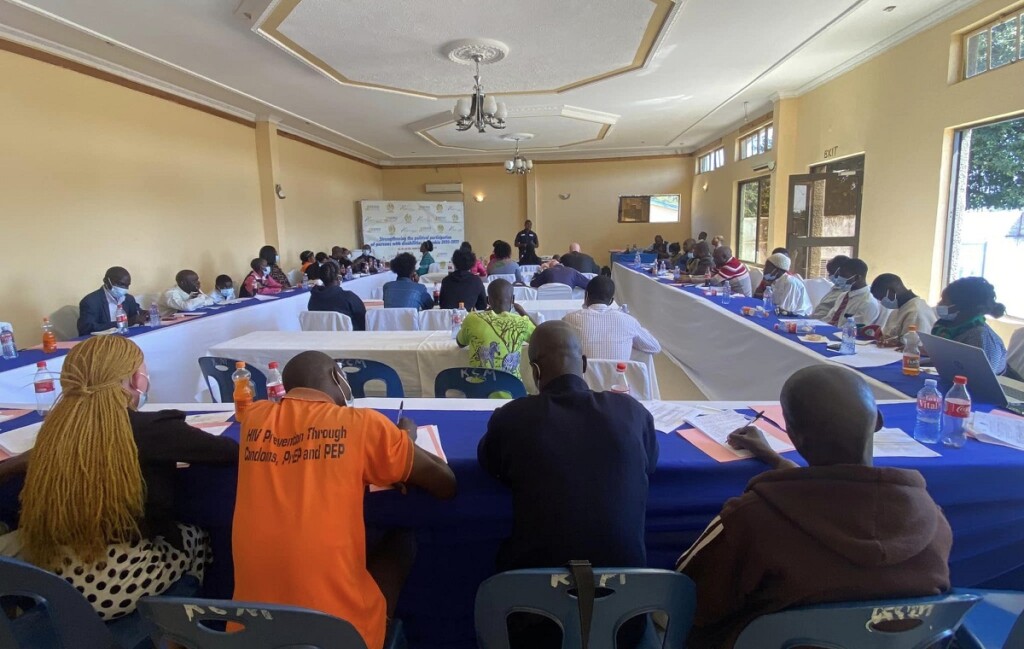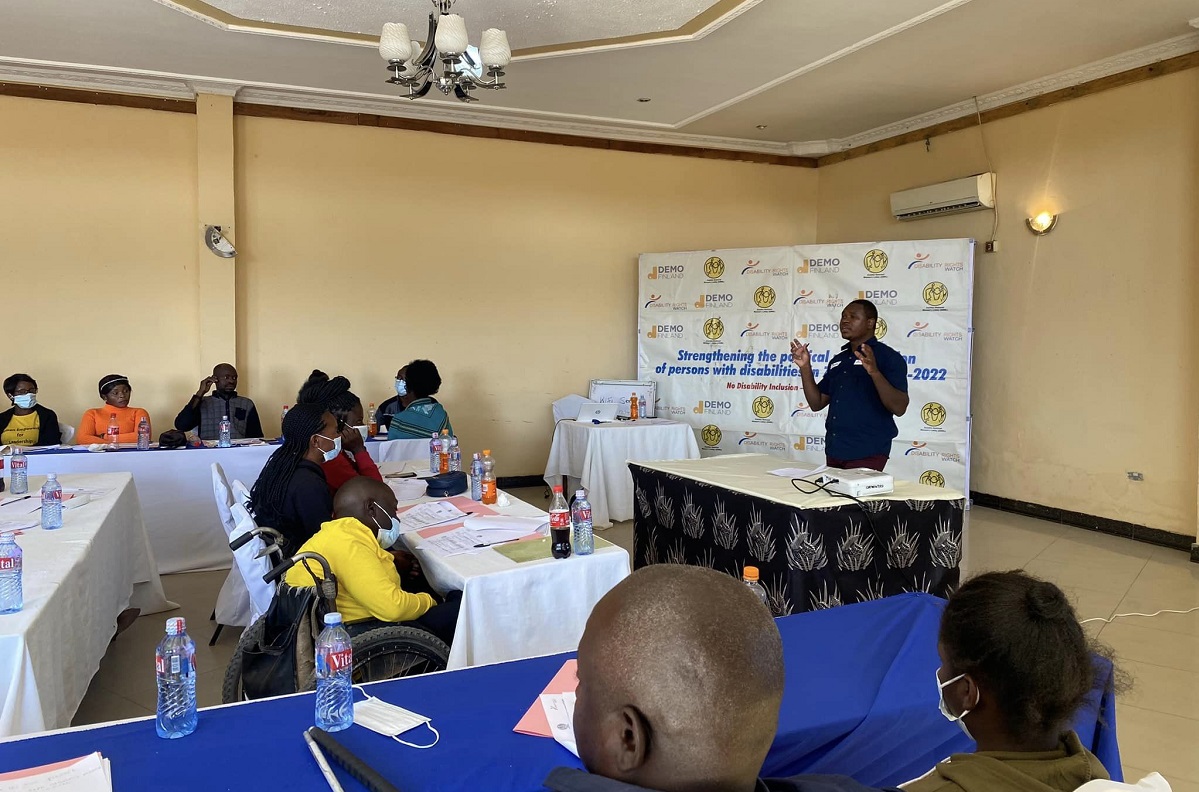The work of Demo Finland and its partners in Zambia has enhanced the political participation of persons with disabilities.
Zambia has a fairly supportive policy and legal framework for persons with disabilities, says Programme Coordinator Bruce Chooma from Demo Finland’s partner organisation Disability Rights Watch (DRW). However, this does not mean that the rights of persons with disabilities to participate in decision-making is implemented in practice. “The political culture in the country was not responding to the aspirations of persons with disabilities and to the intentions of the law on disability rights and inclusion in the legislation”, says Chooma.
Demo Finland, DRW and the Zambia National Women’s Lobby (ZNWL) set up a project in 2020 to respond to this need. The aim of the project is to strengthen inclusive multi-party system and the political participation of persons with disabilities. “We really regard strengthening the participation of persons with disabilities as part of strengthening our democracy”, says Director of Programmes Golden Nachibinga from ZNWL. “In terms of having elections or changing leaders, that has always happened in Zambian democracy. But marginalised groups, such as women, youth and persons with disabilities have always had challenges in ascending to political leadership positions.”
According to Nachibinga, statistics indicate that between 10–15% of Zambia’s adult population consists of persons with disabilities. Despite this, there are very low numbers of persons with disabilities in the institutions where decisions are made at national or local level. Nachibinga notes that the local level is important because the new government is pursuing a policy of decentralisation where most of the decisions are made locally.
Work at different levels
Challenges to participation include attitudes as well as institutional barriers. “We come from a charity and medical perspective to disability where disability programming has always been a matter of sympathy”, says Chooma. “People don’t perceive persons with disabilities as having the capacity and the potential to do anything for themselves, but that they should be recipients of aid and help. Even many persons with disabilities did not think that their political rights were a major issue for them. The biggest issue was access to basic necessities like food and clothing.” However, during the project they have realised that when empowered, they are able to advocate strongly for their rights in every aspect of life.
We regard strengthening the participation of persons with disabilities as part of strengthening our democracy.
Golden Nachibinga
The project has co-operated with the Electoral Commission of Zambia to address institutional barriers to participation. Some measures have already been taken, such as lowering the nomination fee for persons with disabilities. But there is also a need to have a more inclusive electoral system, with a mixture of direct representation and quota systems that would bring more possibilities of representation for persons with disabilities. Funding is also a major issue, because becoming an election candidate and campaigning require a lot of resources in Zambia. Therefore, networking and resource mobilisation are among the topics of the project’s trainings.
The project works at two levels, the first of which is building the capacity of persons with disabilities. DRW and ZNWL have organised trainings where persons with disabilities learn to know and advocate for their civil and political rights. They have also established a political dialogue network for persons with disabilities.
The other level is work with political parties, because most people who access public positions come through political parties. Political parties have received trainings on inclusivity, with specific focus on the inclusion of persons with disability. “The purpose of those trainings is for political parties to reflect on their own systems and practices and to develop measures that they can apply to ensure accessibility for persons with disabilities”, says Golden Nachibinga. According to Nachibinga, the aim is to have measures that are documented in political party constitutions or manifestos in order for the measures to be institutionalised. This is better than initiatives created by party leaders or culture adopted only by the central organs of the party, because changes need to be sustainable.

Demo Finland supports the political participation of persons with disabilities also in Kenya, in partnership with the Westminster Foundation for Democracy (WFD). Partners in Zambia and Kenya have had the chance to learn from each other’s projects. In Zambia, a technical working group for the project has just been established, which WFD had found to be a good practice in the Kenyan project. In the technical working group, representatives of organisations of persons with disabilities and political parties come together to have deliberate discussions about disability inclusion and to monitor the progress of the implementation of disability inclusion plans in the political parties. Political parties can learn from each other and persons with disabilities can share their expertise in the technical working group.
Change of attitudes and mindset
In democracy support, three years is a short time span, but Chooma and Nachibinga have already seen the project make a difference. Chooma says that the biggest change has happened in the attitudes and mindset both of individuals and political parties. “The project has succeeded in building the confidence of persons with disabilities to engage with the political system. We have seen a good number of them issuing very strong statements on their rights. We have also now seen political party leaders mentioning disability issues in the media, which was unheard of before.”
Nachibinga says that the number of persons with disabilities joining political parties has increased since the project started, and some of them have been able to access decision-making positions within the structures of the political parties. This has been possible because the political parties have managed to create a more conducive environment in terms of attitudes as well as physical accessibility. It has been important that the changes have not been made only at the top level of the political parties, but they are mainstreamed throughout the political party structures. “The environment is expected to remain conducive for persons with disabilities who wish to participate in the political processes”, says Nachibinga.
The project has succeeded in building the confidence of persons with disabilities to engage with the political system.
Bruce Chooma
Chooma talks about the changes in the political parties’ mindset: “They have begun to realise that persons with disabilities are a significant voting bloc and that they should target them with their political messaging. Political parties have seen the benefit of being sensitive to the rights of marginalised people, because that gives them a positive image towards the public.” Participation in decision-making is everyone’s right, but political parties also have other good reasons to promote disability inclusion.
In addition to the change of mindset, political parties have taken concrete steps to enhance disability inclusion. Several political parties are drafting disability inclusion plans, and accessibility reviews have been conducted in the premises of some political parties. Bruce Chooma has another example of one of the political parties in the project: “The party has developed a strategic plan where there are clear measures about how to recruit and retain persons with disabilities in their structures. They have included a specific sub-committee on disability, which is chaired by a person with a disability, and they work in the communities to encourage persons with disabilities to join the political party.”
A good number of persons with disabilities participated in the 2021 elections at different levels in a manner never seen before, thus indicating an important positive contribution of the project to ensuring the rights of persons with disabilities to stand for election as opposed to being mere voters.
A good number of persons with disabilities participated in the 2021 elections at different levels in a manner never seen before.
Of course, political parties still have challenges in implementing new practices. Political parties are mainly run on a voluntary basis, and their limited resources set the framework for how quickly and how far they can go in promoting the inclusion of persons with disabilities.
There is still plenty of work to do. What drives Golden Nachibinga and Bruce Chooma forward?
Chooma: “The determination to see a more inclusive society, one that invests in the dignity of everyone because persons with disabilities have been a historically marginalised group and they have not lived in a society where they have had the means to have their voices heard and where they have been given the opportunity to lead. With interventions like ours we are contributing to this inclusive society that we desire, not just for this generation, but even for the ones to come.”
Nachibinga in motivated by the project’s values that he is convinced of. “The fundamental issue is really to see a better life for people in a democratic society.”

